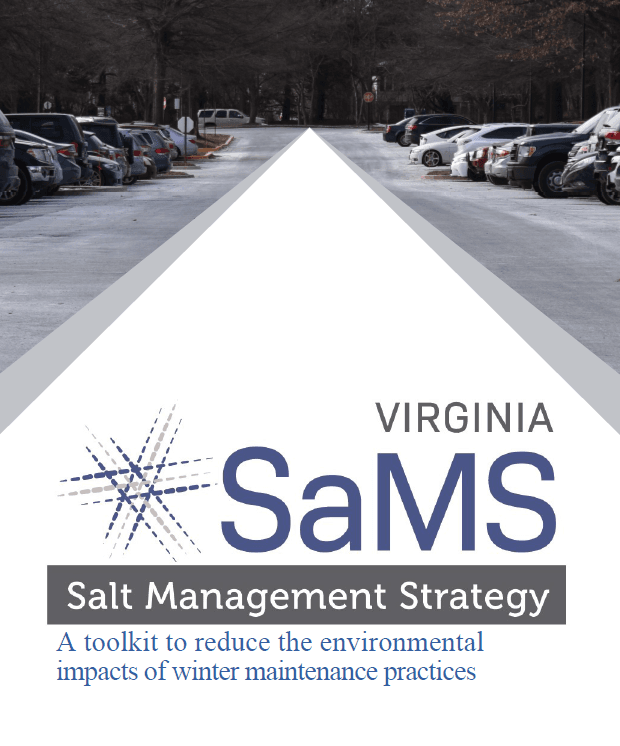De-Icing Materials
Potomac River Basin Drinking Water Source Protection Partnership
The Urban Issues Workgroup has made the impact of roadway salts and de-icers on drinking water sources a priority issue. The workgroup has prepared a list of resources on roadway and airport deicing activities. This includes information for professionals and the public interested in de-icing operations, their impacts, and measures to reduce winter-weather related chemical usage.
Va. DEQ Salt Management Strategy
Many DWSPP member organizations were part of the large and diverse group of stakeholders active in the development of the Virginia Department of Environmental Quality (DEQ) Salt Management Strategy Toolkit (SaMS). The extensive stakeholder process was used to foster a collaborative effort to meet the chloride loads specified in the Accotink Creek total maximum daily load (TMDL) and address salt application in the region. Learn more about the process on DEQ’s Salt Management Strategy Development page. The Toolkit is being implemented under the leadership of the Northern Virginia Regional Commission.
As part of the process, the Interstate Commission on the Potomac River Basin (ICPRB) created the technical report Salt Management Strategy: Environmental Impacts and Potential Economic Costs and Benefits of Improved Management Practices in Northern Virginia. Learn more about their involvement in the process on the ICPRB website.
Roadway Deicing and Impacts to Drinking Water Sources and the Environment
- Fairfax Water presents on chloride trends in the Potomac River at MWCOG’s road salts workshop (Fairfax Water, 2016)
- River chloride trends in snow-affected urban watersheds: increasing concentrations outpace urban growth rate and are common among all seasons (USGS/Science of the Total Environment, 2014)
- Dissolved-Solids Sources, Loads, Yields, and Concentrations in Streams of the Conterminous United States (USGS, 2014)
- Environmentalists Warn That While Salt Is Great For Roads, It’s Not Good For Rivers (WAMU, 2014)
- Road Deicers Could Be Making the Region Too Salty (Sea Grant Maryland, 2013)
- Two Maryland counties to test new road treatment on I‐70 (WTOP, 2013)
- Integrated road salt management program to mitigate damage to blueberries in West Michigan (Michigan State University Extension, 2011)
- Study: Road Salt Found in Minn. Waters (Water and Wastewater News, 2009)
- Does road salting induce or ameliorate DOC mobilisation from roadside soils to surface waters in the long term? (University of York, 2009)
- The 411 on Road Salt (MD Department of the Environment)
- Road Salt Reduction (NH Department of Environmental Services)
- Deicing (Environmental Literacy Council, 2008)
- Long-term road salting effects on dispersion of organic matter from roadside soils into drainage water (University of York, 2008)
- Effect of long-term changes in soil chemistry induced by road salt applications on N-transformations in roadside soils (University of York, 2008)
- Effects of Road Deicing on Environment (Newswise, 2004)
- Deicing Compounds and Utah Landscapes (Utah State University Extension, 1999)
Best Practices for the Homeowner
- Be Salt Wise! (Wisconsin Salt Wise Partnership)
Deicers and Stormwater Runoff
- Minimizing Effects from Highway Deicing (EPA, 1999)
- Impacts of Salt and Sand (University of Michigan, 2010)
Airport Deicing
- Airport Deicing Effluent Guidelines Documents (EPA, 2012)
- Anti-icers make airport runoff toxic (Geotimes, 2007)
Common Roadway Deicers and Alternatives
- Deicers for Walkways & Roads (University of Missouri Outreach & Extension, 2007)
- Highway Deicing – Comparing Salt and Calcium Magnesium Acetate (Transportation Research Board, 1991)
Winter Operations Training Resources
- New Hampshire Green SnowPro Certification Program and Resources
- Smart Salt Training (Minnesota Pollution Control Agency)
- Snow and Ice Control Material Application (University of Minnesota)
- Clear Roads Computer Based Training Series (American Public Works Association)
- Twin Cities Metropolitan Area Chloride Management Plan (Minnesota Pollution Control Agency)
- Winter Maintenance Assessment tool (WMAt) (Minnesota Pollution Control Agency)

